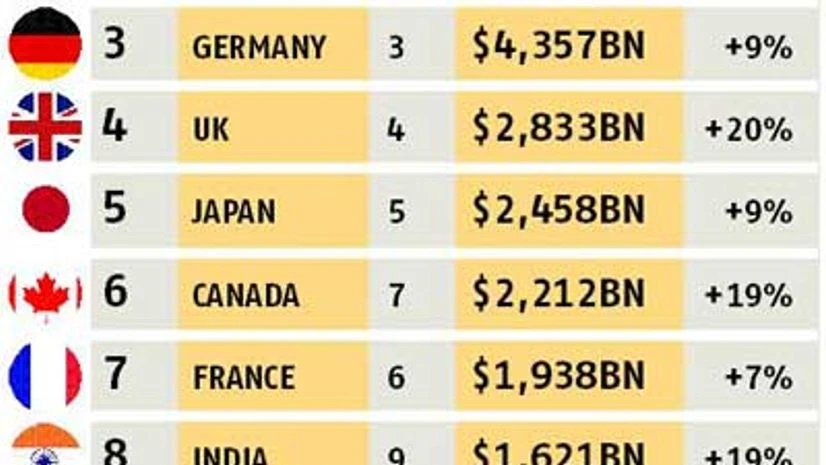The London-based brand valuation agency, Brand Finance has raised India's ranking by one in its December, 2014 report on Nation Brands.
The report measures the strength and value of the brands of 100 leading countries, using a method that values the world's largest companies.
The report arrives at a nation's brand value by estimating future sale of all brands in the nation, its royalty-rate range, including the influence the nation brand on royalty in a given industry, and the country's performance across goods & services, tourism, people & skills and investment.
In the top-ten list, Canada, India and Australia have all climbed a place in the rankings after growth of up to 24 per cent.
Though the appointment of India's new Prime Minister Narendra Modi was greeted cautiously by many western governments, the report says, he has provided a renewed sense of purpose to India's bureaucracy, improving confidence at home and abroad in the ease of doing business.
The India Brand Equity Foundation, according to the Brand Finance report, is reinforcing that message, providing a gateway for investors by providing information on India's products, services and business climate with the aim of promoting "international awareness of the Made in India label in markets overseas."

However, the report says, that it could be argued that the phrasing does not sufficiently differentiate India from other nations.
Traditionally, the tourism industry has been used by countries as a driver for country-branding and brand image, especially by emerging countries. But it is difficult to drive a whole country brand via one industry, and in tourism it is now becoming difficult to achieve clear differentiation. This is evident in a selection of slogans from a range of Asian countries such as 'Amazing Thailand', 'Incredible India', 'It's more fun in the Philippines', and 'Wonderful Indonesia'. It seems only Malaysia, with its '...Truly Asia' campaign, has been able to distil the political agenda of its government who see the country as multi-racial and multi-cultural, says the report. Branding cannot be successful without the relevant political will and policies.
Countries are becoming aware of this challenge. Branding activities by nations, while on the rise in the last two decades, are trying to address how to encapsulate the complexities of a country in one brand, claims the report.
Countries are trying to maximise the strong elements of their identity and image, and improve the negative perceptions, to be more competitive in the global marketplace.
Several countries have acknowledged that their nation branding activities would not be confined to one industry, but instead, span many sectors to raise their profiles and build their images in a holistic way. Some are developed nations (South Korea, Canada, Switzerland and Australia), and others are developing countries classified as NICs (Newly Industrialised Countries) such as India, South Africa, China, Turkey, Malaysia, Mexico and Brazil. In different ways, they are all trying to ensure that their national brands are stronger than their competitors'.

)
